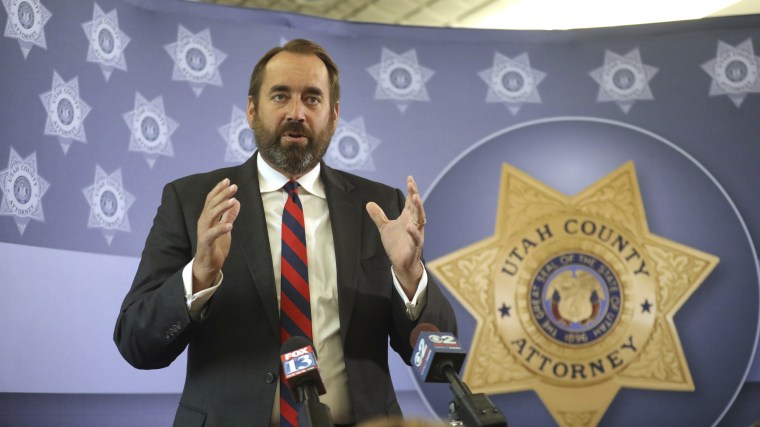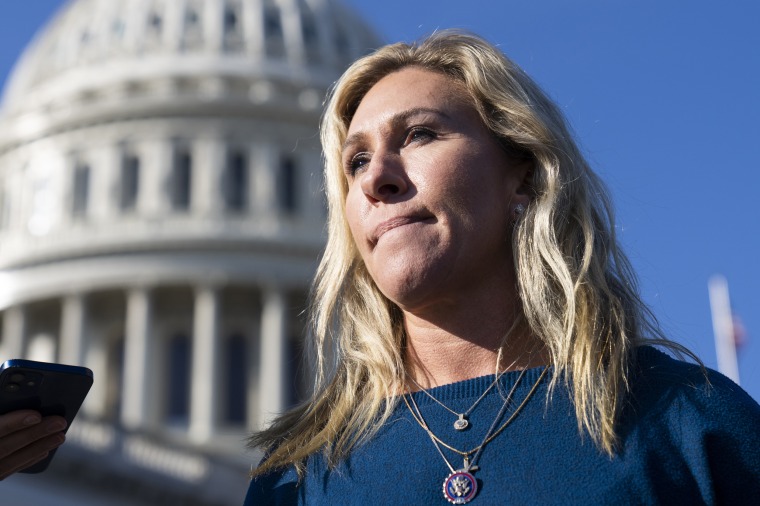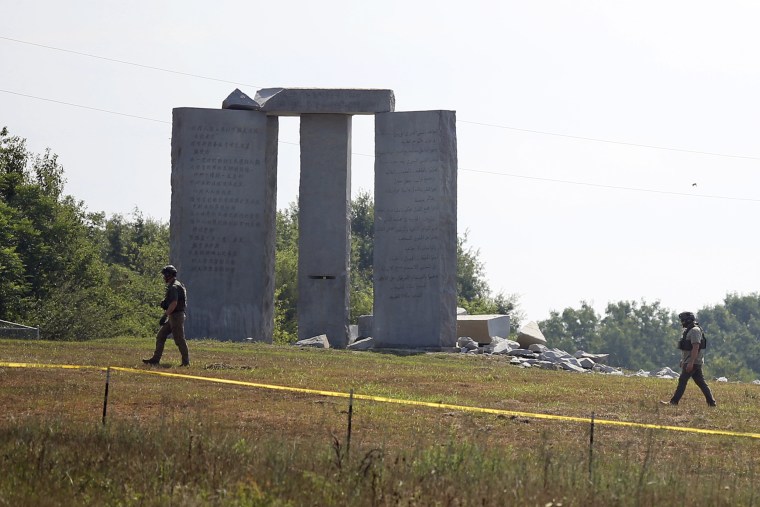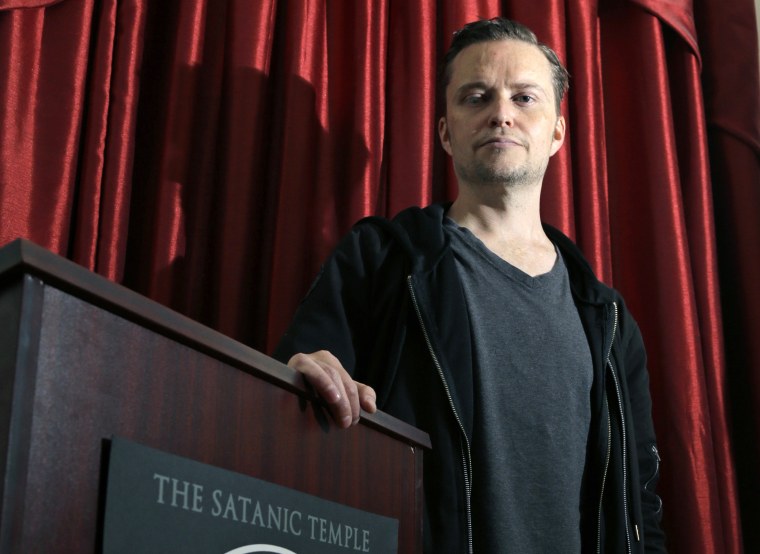Satanic panic is making a comeback, fueled by QAnon believers and GOP influencers
PROVO, Utah — On June 1, David Leavitt, the prosecuting attorney for Utah County, stood behind a lectern in his windowless Provo office before a gaggle of reporters. Wearing a gray suit and an exasperated look, he wanted to make something categorically clear: Neither he nor his wife were guilty of murdering or cannibalizing young children.
It was, by all accounts, a strange declaration from the progressive Republican prosecutor, a Mormon and younger brother of a former Utah governor, Mike Leavitt, who had earned a name for himself by prosecuting a well-known polygamist in 2001. But David Leavitt was up for re-election, Utah County voters would start casting ballots the next week, and the allegations, ridiculous as they may have sounded, had started to spread online and throughout the community.
Some of Leavitt’s most high-profile political opponents were willing to at least wink at the allegations against him: Utahns for Safer Communities, a political action committee opposing Leavitt’s re-election, posted his news conference to YouTube with the caption, “Wethinks He Doth Protest Too Much,” and on their website, the group wrote that Leavitt “seems to know more than he says.”
Leavitt lost the election, most likely not just because of the allegations against him but because of his liberal style of prosecution in a deeply conservative county where opponents labeled him as “soft on crime.” But the allegations’ impact on Leavitt was clear. After decades of serving as a city and county attorney with grander plans for public office, Leavitt now doesn’t think he’ll run again.
“The cost is too high,” he said recently in an interview from his home.
Leavitt’s experience is one of a spate of recent examples in which individuals have been targeted with accusations of Satanism or so-called ritualistic abuse, marking what some see as a modern day version of the moral panic of the 1980s, when hysteria and hypervigilance over protecting children led to false allegations, wrongful imprisonments, decimated communities and wasted resources to the neglect of actual cases of abuse.
While the current obsession with Satan was boosted in part by the QAnon community, partisan media and conservative politicians have been instrumental in spreading newfound fears over the so-called ritualistic abuse of children that the devil supposedly inspires, sometimes weaving the allegations together with other culture war issues such as LGBTQ rights. Those fears are powering fresh accusations of ritual abuse online, which are amplified on social media and by partisan media, and can mobilize mobs to seek vigilante justice.

Witch hunts have traditionally been associated with courts — even the kangaroo kind — but today, the accused can be branded satanist pedophiles at the speed of the internet. Online accusers can bypass police, therapists and the traditional media and out their alleged abusers straight to audiences of millions.
“The ʼ80s and ʼ90s were terrifying and they ruined people’s lives, but they were constrained in certain ways by network technologies,” said Whitney Phillips, an assistant professor in the University of Oregon’s School of Journalism and Communication and co-author of the book, “You Are Here: A Field Guide for Navigating Polarized Speech, Conspiracy Theories, and Our Polluted Media Landscape.”
Consider how things unfolded for the Leavitts.
The rumors started on YouTube when Nicholas Rossi, an American who has been accused of faking his death and escaping to Scotland to evade rape charges in Utah, posted videos in which he accused Leavitt and his wife of leading a “ritual sex abuse cult.” Leavitt was overseeing an effort to extradite and prosecute Rossi.
As evidence for his claims, Rossi posted a 151-page statement, made a decade ago by an unnamed woman as part of a criminal case against a therapist that was later dismissed. That statement — which NBC News obtained via public records request to the Provo police department — included gory allegations of sexual abuse and mass murder from the 1980s and ʼ90s perpetrated not just by the therapist, but by more than a dozen other members of the Provo community, including David Leavitt and his wife. In a phone interview, Rossi, who posted the document to his now-defunct website, Zeus News Now, declined to share how he learned about or obtained the document.
The accusations were part of a new case from Utah County Sheriff Mike Smith. Smith, who backed Leavitt’s opponent, had just announced he was opening an investigation into “ritualistic child sexual abuse from as far back as 1990.” (Smith declined an interview with NBC News but publicly denied Leavitt’s claim that the Utah County Sheriff’s office had somehow been involved with the leak of the document. The still-open investigation has netted more than 130 tips from the public, according to a sheriff spokesperson, Sgt. Spencer Cannon.)
A local reporter for KSTU, Salt Lake City’s FOX affiliate, chasing a story on the investigation texted the Utah County Attorney’s office — did Leavitt have any comment on this 151-page document?
In lieu of a comment, Leavitt held his news conference.
What upset Leavitt most, he said, holding back tears, was how the accusations had harmed his wife.
Leavitt’s wife, Chelom, a soft-spoken attorney-turned-academic who researches “mindfulness and healthy sex,” described the impact in an interview from her office at Brigham Young University, where she is an assistant professor. The document had been posted to several conspiracy theory news websites and Telegram forums with tens of thousands of followers. Soon after, people began emailing BYU’s dean, calling for Chelom’s firing, citing new, confusing allegations tying her to the Clinton family, satanic pizza parlors and worldwide human trafficking organizations. They called her a demon.
Even her friends had questions. A woman she had known well for years texted asking whether there was “anything to the rumors.”
“That someone who knows me could think that there’s a seed of truth in this — that’s tough to digest,” Chelom Leavitt said.
The belief that devil-worshippers disguised as trusted members of the community are stalking neighborhood children to abuse and sacrifice them in secret satanic rituals is more prevalent than one might imagine.
“This was a widespread belief back in the ʼ80s,” said Joseph Uscinski, a political science professor at the University of Miami, who studies conspiracy theories. “And when the satanic panic disappeared, it just disappeared. It wasn’t like there was a reckoning.”
Uscinski’s work includes nationwide polls to measure belief in particular conspiracy theories. A survey of 2,000 U.S. residents conducted in June by Uscinksi and a colleague through the University of Miami revealed fears over satanic rituals and child sexual abuse are pervasive.
One-third of respondents agreed with the statement, “members of Satanic cults secretly abuse thousands of children every year.” One quarter agreed that “Satanic ritual sex abuse is widespread in this country,” and 21% agreed that “numerous preschools and public schools secretly engage in Satanic practices.”
As Uscinski’s survey seems to be the first of its kind, it’s difficult to say whether people are now more obsessed with Satan or if it just feels that way.
Discussion about satanism and satanic abuse has increased in recent years, according to data provided to NBC News by Zignal Labs, which analyzes social media conversations. From 2007 to 2014, mentions of satanism on Twitter increased steadily year over year until 2016, when mentions spiked 37%, during a presidential election and at the height of “pizzagate,” an online conspiracy theory rooted in the false belief that a ritualistic child sex ring was run out of a Washington pizza parlor.
The trend continued until it peaked in 2020, during the next presidential election and at the height of QAnon’s popularity. It remains elevated, according to Zignal Labs data.
The rise in conversation surely has much to do with the kind of people fixated on the devil.
“A lot of national and local politicians are engaging in satanic panic rhetoric,” Uscinski said.
“These are the worst things that you can accuse someone of. There’s no redemption. So they make great cudgels to beat your political opponents with.”
The daily invocations of Satan by the biggest players in conservative politics and media are too numerous to catalog in full.

Rep. Marjorie Taylor Green, R-Ga., credited the devil with whispering to women who choose to have abortions and controlling churches who aid undocumented immigrants. In June, she tweeted a video of a man dressed as the devil, stating that the mythical creature would be the next witness called by the House Jan. 6 committee. “They all know him, they all love him, and some even worship him,” she wrote.
Charlie Kirk, the president of one of the largest conservative groups in the country, Turning Point USA, recently opined that Republicans should “use the law to shut down Satanism.” Last year, Fox News host Tucker Carlson expressed his opinion on trans people, telling his viewers, “When you say you can change your own gender by wishing it, you’re saying you’re God, and that is satanic.” The Republican nominee for Missouri’s St. Louis County executive, the top job in the local government, is currently suing her former employer over its mask mandates, citing their use in “satanic ritual abuse.”
And after President Joe Biden’s recent speech on the threat that “MAGA Republicans” pose to democracy, the very subjects of his warnings framed the president’s address as “satanic,” because of the red lights illuminating the backdrop of Philadelphia’s Independence Hall.
Popular culture and social media have also ferried ideas about satanism and widespread child abuse from fringe to the mainstream.
The music video for Lil Nas X’s song “Montero (Call Me by Your Name),” which featured the artist giving the devil a lap dance, and a related limited edition sneaker, “Satan shoes,” which contained a drop of blood, invited shocked coverage from Fox News and condemnation from political leaders.
Conspiracy theories similarly engulfed the tragedy in Houston at the Astroworld music festival in November, in which 10 people were crushed to death as the rapper Travis Scott performed on stage. Social media sleuths gathered livestreams of the performance and pieced them together to come to an otherworldly conclusion: that the concert was actually a satanic ritual. The videos weren’t widely shared by devoted conspiracy theorists or religious zealots, but by mainstream Gen Z and millennial users.

This kind of participatory ferreting out of Satan from the popular culture and “raising awareness” of myriad threats to children — real and imagined — were a hallmark of the 1980s’ panic, said Sarah Hughes, author of “American Tabloid Media and the Satanic Panic.”
The public service announcements, after-school programs, sitcoms, round-the-clock news networks, courtroom coverage and new “infotainment” specials hosted by news-adjacent hosts like Geraldo Rivera and Oprah Winfrey all fueled the hysteria, Hughes said.
As issues surrounding children gained national attention, an emerging section of 1980’s media obsessed over child safety issues, including kidnapping, pedophilia, child abuse and cult membership.
“People just ate it up,” she said. “The threats were inflated to a level that was just completely outside the parameters of what was real. There was an assumption that ‘we have to protect these innocent vessels who are the prey of the devil,’ and everything becomes geared toward, ‘Something is coming to get your child.’”
The modern-day equivalent of those hypervigilant PSAs and daytime talk shows is found online: in posts and videos urging “awareness” for dangers like random white vans and other child-trafficking urban legends. These amateur PSAs are seen immediately by millions, with the option to share them across communities.
That rhetoric is not without consequence. People and places perceived as satanic have been the target of harassment, threats and worse in recent months.
Last year, a child in North Wales was kidnapped while abductors held his foster mother at knifepoint. Wilfred Wong, an evangelical Christian and long-time activist behind the group Coalition Against Satanist Ritual Abuse, whose goal is “to increase public awareness and action regarding satanist ritual abuse,” was sentenced to 17 years in prison for his role in the abduction. Wong and a group of five others said they were trying to rescue the child from his father, whom they believed to be a satanist and pedophile.
In the U.S., a Republican candidate for governor in Georgia, Kandiss Taylor, campaigned on demolishing the Georgia Guidestones, a tourist attraction known by some as American Stonehenge. When the mysterious monument — made up of massive granite slabs etched with innocuous rules for living — was blown up in July, Taylor seemed to celebrate, calling them “satanic.”

The Satanic Temple, a nationwide religious organization known for its legal challenges against what it sees as an encroaching Christian theocracy in the U.S., has also become a target, in part for its advocacy of LGBTQ rights and reproductive rights.
In June, the annual pride parade in Coeur d’Alene, Idaho, became the subject of attention from the far right after a flyer circulated that featured more than 60 sponsors including the ACLU of Idaho, the Idaho State Police and the Idaho chapter of The Satanic Temple.
“‘Family friendly drag dance party’ being promoted by the Satanic Temple in Idaho. We are living in hell,” tweeted Libs of TikTok, a popular conservative Twitter account that often draws negative attention to LGBTQ events and drag shows.
That tweet, and the resulting media frenzy and ensuing harassment it inspired, caused the Idaho Satanic Temple to drop out of the event. Even so, multiple anti-LGBTQ and white nationalist groups descended on the park, carrying long guns and banners that read “Groomers are not welcome in Idaho,” invoking the term that has bridged anti-LGBTQ activism and the more generic panic over child trafficking and abuse. (Anti-LGBTQ politicians and activists have equated LGBTQ people with predators who abuse children as part of a “gay agenda,” the well-worn panic that the gay rights movement’s true motivation is recruitment. LGBTQ groups have rejected those accusations as homophobic tropes.) Thirty-one members of the white power group Patriot Front were arrested on charges of conspiracy to riot.
The night before Pride in the Park, a doorbell camera captured video of a man wearing a T-shirt with the word “God” written across the front setting ablaze the front porch of the Satanic Temple headquarters in Salem, Massachusetts. In a backpack left at the scene, police found a copy of the Constitution and a bible. At a hearing where he was detained, Daniel Damien Lucey, 42, pleaded not guilty to arson, but reiterated what he had apparently told police: that he would “be OK” with people inside the headquarters getting hurt as long as they were “devil worshippers.” Lucey was indicted this month by an Essex County grand jury, and his arraignment is scheduled for October.

Lucien Greaves, the co-founder of The Satanic Temple, said in a phone interview that his group has grown accustomed to the threats, as it is now routinely mentioned alongside a number of other perceived dangers, including socialism and child abuse.
“The satanic panic mongers have always loved the idea that we’re harassing children or otherwise harming them,” he said. “And that whatever they do against us is justified in the name of preserving the children.”
Greaves said demonization by the religious right is predictable, but he is concerned about what feels like the creeping normalization of satanic-panic-style beliefs in the mainstream or even progressive culture.
“Moral panics don’t really take off when they can be brushed off as being a hysterical evangelical or right-wing talking point,” he said.
Social media can also power new accusations, launch police investigations and invite harassment or worse upon the accused who have little recourse to defend themselves.
On July 1, police in South Windsor, Connecticut, announced that they were reopening an investigation into allegations of sexually explicit crimes against several members of the community. Those allegations had come from TikTok — where a 25-year-old woman named Haley Garcia, who lives in California, posted a video naming her parents and seven others as part of an “elite network” that had done “many ritualistic satanic things” to her and other children years ago.
“That’s what’s happening in Connecticut and beyond,” she said in the video.
The South Windsor Police Department noted that they and the Department of Children and Families had investigated the allegations twice in the last seven years but had been unable to corroborate them.
Garcia, who did not respond to interview requests, is a spiritual coach and self-described shaman, who charges hundreds of dollars per hour, according to her website, and has more than 313,000 subscribers on TikTok. Her video has been viewed 5.3 million times and was shared by accounts with tens of thousands of followers, including “TrueCrimeandRedWine” and more locally, in a private Facebook group, “South Windsor community,” where 7,000 neighbors weigh in on local happenings.
“Let’s all hope justice is served,” one commenter responded.
Garcia received more than 13,000 comments on her TikTok video. Most were in support, but there were exceptions. A user named Frank Day, whom Garcia had named as one of her ritualistic abusers, wrote that she was lying in an attempt to further her business. He asked people to DM him to hear the truth.
“I went in, swords drawn, and tried to wade my way through it,” Day said in a phone interview. “And then I realized what I was up against.”
Social media accounts belonging to the accused were swarmed with Garcia’s supporters. People commented under photos of children that their parents were pedophiles and posted their home addresses. (NBC News reached out to Garcia and the people she accused. Garcia did not respond to requests for comment. The other people she accused either did not respond, or declined to be interviewed or to go on the record, citing fears of increased harassment.)
Day spent a week reporting to TikTok the videos that he said had falsely named him as a sexual abuser to no avail. Flags for bullying or harassment all came back with “no violations,” he said. (TikTok doesn’t have an explicit rule against accusing someone of a crime without evidence.) A representative for TikTok declined to comment.
Day described Garcia’s family as friends who owned the one house in the neighborhood with a swimming pool. Kids, including his own, were always welcome, he said.
“I’ll just say categorically, none of this happened,” Day said in a phone interview. “I’ve known this family for 20 years and none of this stuff is true.”
Day said he went to his police precinct the day of Garcia’s posts, because of the messages that started flooding into his email, his social media DMS and his phone.
By the time Day thought to make his Facebook profile private, it had already been swarmed with Garcia’s supporters. People commented under photos of his children that he was a pedophile, posting his home address and writing that they were “coming for him.” Some described the things that would happen to him in prison. Others sent him violent videos like one with kittens being put through sausage grinders. They wrote that his grandchildren should be kept far away from him.
Day has hired a lawyer and is exploring legal remedies.
“It was just chilling,” he said. “I was afraid the first couple of days, and now I’m just angry.”
Phillips, the University of Oregon assistant professor, said the internet’s power is particularly worrisome in light of what appears to be a renewed satanic panic.
“The internet has basically jumped over the need for other intervention,” she said. “You can have an accusation that goes viral, be seen by millions of people by the end of that day. That was never possible before.”
“You can almost foresee what is coming next,” Phillips said. “It’s what we’ve seen before, but all of the bulwarks are gone.”
CORRECTION (Sept. 14, 2022, 11:25 a.m. ET): A previous version of this article misstated the employer of a local journalist. It is KSTU, the FOX affiliate in Salt Lake City, not Fox News.


